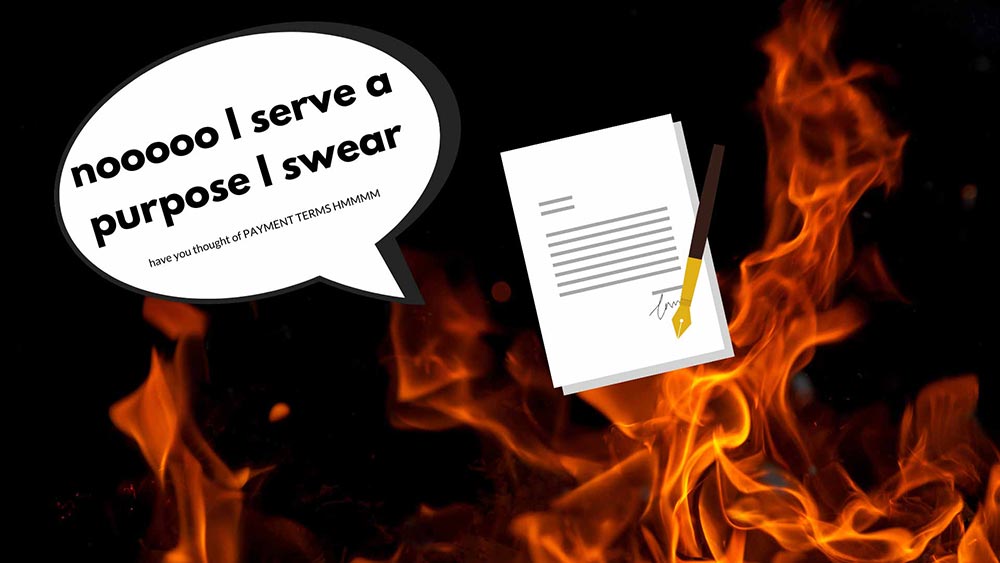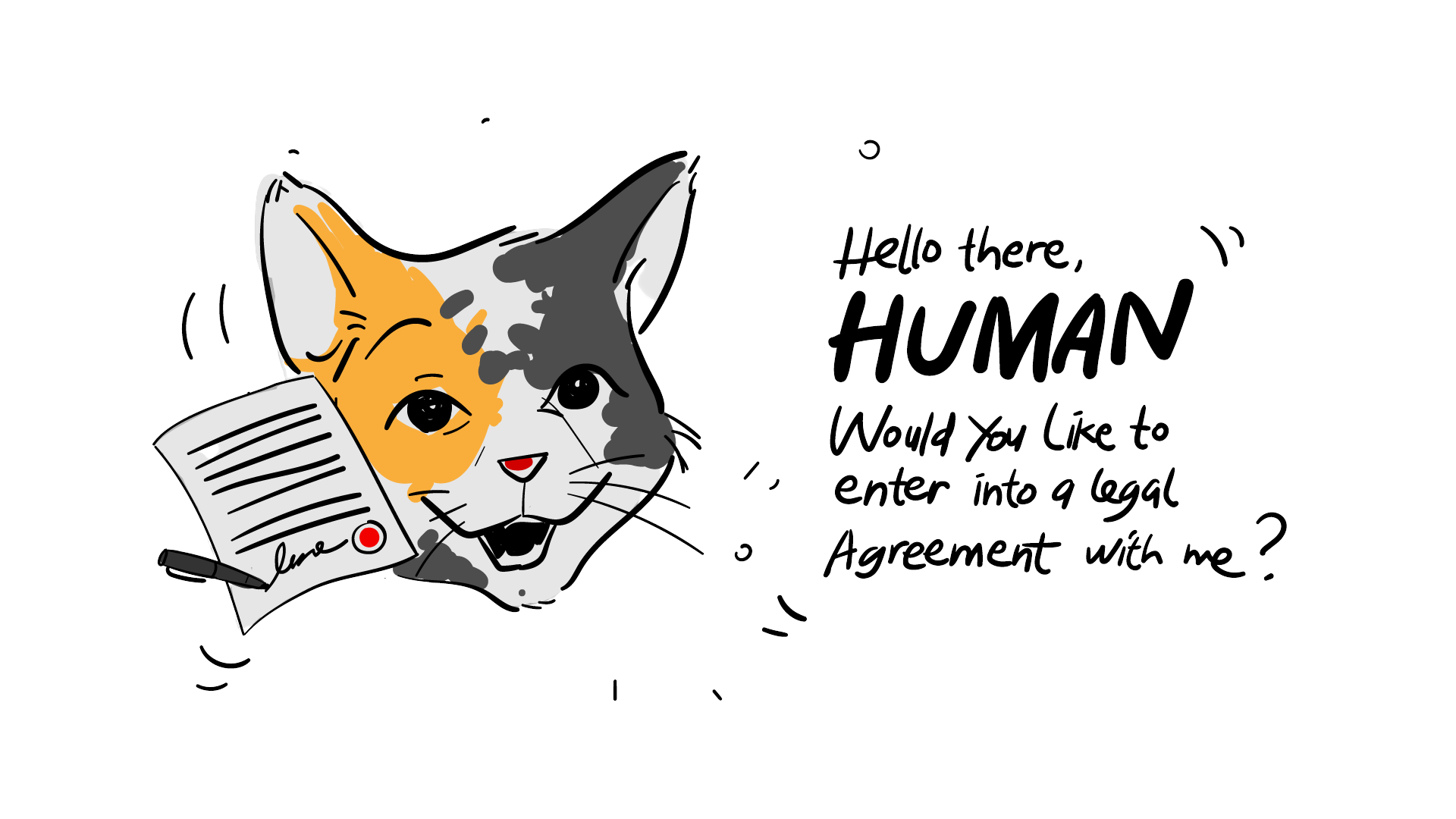There are 3 different kinds of “Yes.”
- Counterfeit
- Confirmation
- Commitment
When you’re negotiating with a web design lead, hoping to make them a web design client, you’re hunting for that Commitment Yes.
A lot of web designers think they need a web design contract to get that Commitment Yes.
But first, let’s understand what each “Yes” means. (from Chris Voss’ Never Split the Difference)
- Counterfeit Yes: One in which your counterpart plans on saying “No” but either feels “Yes” is an easier escape route or just wants to disingenuously keep the conversation going to obtain more information or some other kind of edge.
- Confirmation Yes: Is generally innocent, a reflexive response to a black-or-white question. Mostly just simple affirmation with no promise of action.
- Commitment Yes: A true agreement that leads to action.
Now you can see why that Commitment Yes is the ultimate goal for web designers, and why the others are mostly fraudulent.
The question is, do you really need a web design contract to get it?

What is a web design contract?
A web design contract is a document between client and web designer that details the scope of a web design project.
Are they legally enforceable? Who knows.
Technically, most legal contracts merely need to have an exchange of goods and the signature of both parties involved. But I’m not a lawyer. Nor do I use web design contracts myself. (more on that later ????)
What do web design contracts typically include?
Things like:
- A detailed description of services included
- Scope of the project
- Pricing for services and additional costs
- Payment terms
- Content sourcing
- Timelines
- Licensing and ownership rights
- Changes and revisions policies
- Privacy and confidentiality
- Liability release
- Terms for contract termination
- A dispute resolution clause
- Signatures to make the contract legally binding
- Other legal garbage your lawyer says you should include
Aren’t you already bummed out just reading that?
Why do web designers insist you should always use a contract?
Oof. A bunch of reasons.
Whether those reasons are truly valid is another story. (can you see where I’m going with this?)
Reasons like:
- Clients making demands outside the scope of the project
- Clients not doing their part in the development of the website
- Clients taking issue with how website and plugin licenses are handled
- But, above all, clients not following the agreed upon payment terms
Notice how all of these fall on the client being the problem? ????
4 reasons I refuse to use web design contracts
Allow me to summarize why I think contracts for web designers are a terrible idea.
1) A contract is a horrible way to begin a relationship

“Seek first to understand, then to be understood.” – Stephen R. Covey (author)
“Hey, it’s lovely to meet you!”
“You too! Please sign this 3 page document detailing all of the ways I’m terrified you’re gonna try to screw me over here, here and… here.”
This doesn’t happen in the real world. If it did, there would be [even more] very lonely people in this world.
So why do you expect your new web design clients to abide by these social rules?
Listen, I get it. Take it from someone who has some serious issues with commitment: it is difficult to put yourself out there and entrust your heart in someone else’s hands.
(wait… are we still talking about web design contracts?…)
ANYwho…
The same principle applies here.
There are zero guarantees that your new web design client won’t be unreasonable, frustrating to deal with, or a general pain in the rear.
BUT, you are definitely increasing the odds of your client getting miffed with you if you choose to use a web design contract. You will immediately put them on the defensive, and they’ll start wondering why exactly you need a contract in the first place.
Which leads me to my second point.
2) Contracts look for opportunities to justify their existence

“It all starts with the universally applicable premise that people want to be understood and accepted. Listening is the cheapest, yet most effective concession we can make to get there.” – Chris Voss (FBI negotiator)
Have you ever purchased something that seemed like a great idea at the time, only to later realize that it is essentially useless? What did you do next?
You looked for every opportunity to justify this purchase. Searching for ways to make this useless thing useful. By using it.
This is exactly what can happen with web design contracts.
Now that you’ve sufficiently begun your new business relationship on a sour note, there’s a powerful little weapon standing between you and your client.
That contract may say it’s there simply to provide protection in a handful of “what if” or “just in case” scenarios, but it’s now actively searching for those scenarios in order to justify its existence.
Try this one on for size:
- You start by setting a maximum amount of work hours based on the price of the quote. Seems reasonable enough, right?
- Your client replies with a demand that you timestamp all of your work. To make sure he’s getting his money’s worth.
- You insist that, in order to do that, you require certain levels of privacy for screensharing. Such as hiding specific elements of your computer that are personal.
- Your client then asks for proof that you are not altering the timestamps as well, since you are now redacting certain parts of the screenshare.
- You point to a clause in the contract that indicates you have the right to redact aspects of a timestamp/screenshare for privacy reasons.
- Your client angrily concedes, and is now on the hunt for his opportunity to win a contract dispute.
This may seem extreme, but it happens more than you’d think. People act extremely irrational when they feel like they’re being taken advantage of or “losing” a deal.
Because, now that you have a contract, you’ve gotta use it at some point? Right?
How else will you be able to say “SEE?? Good thing I have this contract!”
3) If you do it right, web design contracts are completely unnecessary

“In preparing for battle, I have always found that plans are useless but planning is indispensable.” – Dwight D. Eisenhower
As we talked about before, the main reason web designers think they need a contract is to protect themselves from unpaid work.
But if a web designer has ever found themselves in a scenario like this, then they’ve structured their sales process poorly.
You can remove all potential instances of someone taking advantage of you simply by applying the 50/50 principle:
The 50/50 Principle:
- 50% deposit upfront
- 50% when the site is complete and ready to launch
It’s that simple.
To filter through your potential clients to find only the ones who are serious about getting a website made, you can require a 50% deposit before any work begins.
You’ll know they’re serious because they’ve made a financial commitment to you right from the start.
And they can feel comfortable that you will follow up with the work because you want to receive that other 50% ASAP.
Then, once the work is done and the client agrees that the website is ready to launch, you can request the final 50% payment.
The key is to do this before the site is launched, not after. If you do it after, then you run the risk of the client taking their time to pay you. Since they’ve already received their end of the deal.
And the client can be reasonably confident that will you come through with the site launch once they’ve paid you, because you really have no reason not to. At this point, you received your money and it’s as simple as a few clicks to launch.
Of course, no deal is guaranteed.
There will always have to be room for trust and transparency. But the 50/50 principle is about as close to guaranteed as you’ll get.
4) Everyone hates contracts

“What’s the difference between a good lawyer and a bad lawyer? A bad lawyer might let a case drag on for several years. A good lawyer knows how to make it last even longer.” – Funny lawyer joke I found
Except lawyers. Lawyers love contracts.
But everyone hates lawyers so we can disregard their thoughts and feelings.
It’s never been easier to learn web design and to start your own web design business. As a result, competition has never been tougher.
Standing out in a sea of web designers is tough. Your customer experience needs to be spectacular.
Do you really want to damage that customer experience by forcing your customer to do something they hate? Right from the start?
So, should you use web design contracts?
You need to weigh the pros and cons on this one.
Above all else, focus on how you can perfect your user experience. From first interaction to final payment.
Then take a look at yourself, your web design business, and your goals.
Really give some thoughts as to what a web design contract is actually providing for both you and your client. And whether it’s truly necessary.
I’ve made my case for why I think web design contracts are a bad idea. But I recognize that I’m in the minority on this one.
Instead of using contracts, I choose to take a trust fall with my new clients right from the beginning. To begin our relationship with a mutual exchange of trust.
It has literally paid off 99% of the time.

Out of the hundreds of clients I’ve worked with over the years, I have lost exactly one due to the fact that I refused to use a contract. It was a deal-breaker for him.
And you know what? He was a lawyer.
So he doesn’t count.





